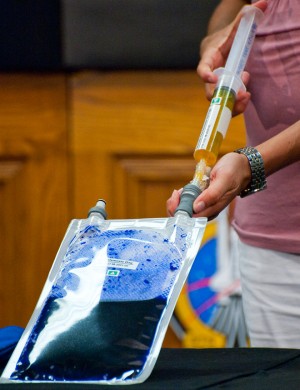 Have you ever dreamed of becoming an astronaut when you grow up? Well, NASA’s latest gadget might make you rethink that game plan. NASA showed off a new toy that they will be sending up with Atlantis on it’s final voyage, the forward osmosis bag. This bag can be used to filter urine and turn it into a sugary sports drink.
Have you ever dreamed of becoming an astronaut when you grow up? Well, NASA’s latest gadget might make you rethink that game plan. NASA showed off a new toy that they will be sending up with Atlantis on it’s final voyage, the forward osmosis bag. This bag can be used to filter urine and turn it into a sugary sports drink.
The forward osmosis bag is a surprisingly low-tech device that does something very important: The bag is used to filter undrinkable water, and turn it into a sports drink. This bag is already in use today on Earth, but NASA will be testing how the process works in zero gravity. Fortunately for Atlantis’ astronauts, they will not be testing the bag with urine, but with just a sample of dirty water. Also the astronauts will not be drinking the liquid; it will only be tested for effectiveness, and not deliciousness.
The international space station already has a water filtration device, but it requires electricity to run, which can be in short supply. The forward osmosis bags are not intended to be a replacement for any current filtration system, but purely as an emergency solution. For instance, they could fall into use if the crew had to make a water landing and drink sea water.
The greater implications of this type of device for the world at large are incredible. Finding pure drinkable water is a real issue for a very large population, and anything we can do to help get clean water to people the better.
Image: Wired


